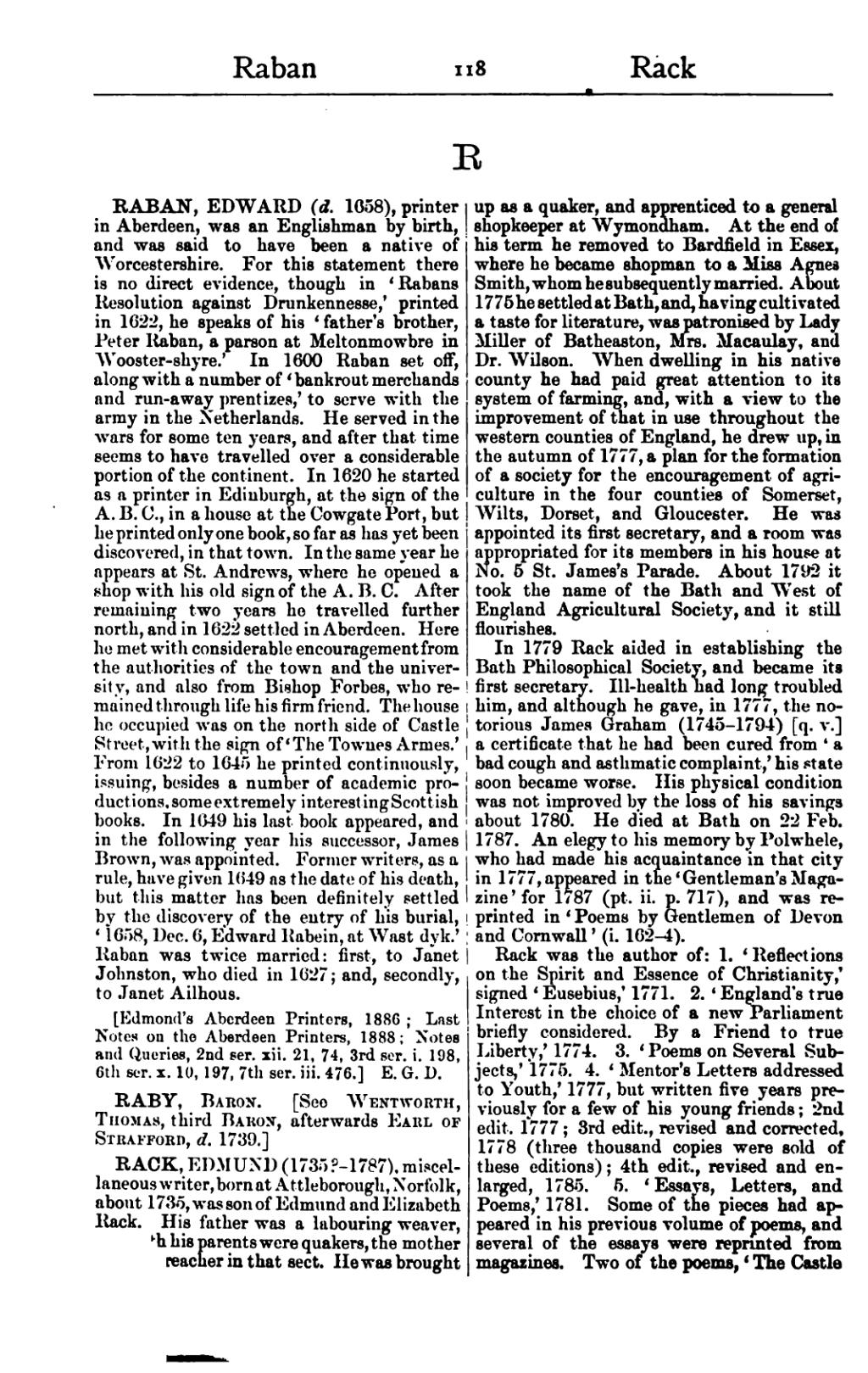RABAN, EDWARD (d. 1658), printer in Aberdeen, was an Englishman by birth, and was said to have been a native of Worcestershire. For this statement there is no direct evidence, though in ‘Rabans Resolution against Drunkennesse,’ printed in 1622, he speaks of his ‘father's brother, Peter Raban, a parson at Meltonmowbre in Wooster-shyre.’ In 1600 Raban set off, along with a number of ‘bankrout merchands and run-away prentizes,’ to serve with the army in the Netherlands. He served in the wars for some ten years, and after that time seems to have travelled over a considerable portion of the continent. In 1620 he started as a printer in Edinburgh, at the sign of the A. B. C., in a house at the Cowgate Port, but he printed only one book, so far as has yet been discovered, in that town. In the same year he appears at St. Andrews, where he opened a shop with his old sign of the A. B. C. After remaining two years he travelled further north, and in 1622 settled in Aberdeen. Here he met with considerable encouragement from the authorities of the town and the university, and also from Bishop Forbes, who remained through life his firm friend. The house he occupied was on the north side of Castle Street, with the sign of ‘The Townes Armes.’ From 1622 to 1645 he printed continuously, issuing, besides a number of academic productions, some extremely interesting Scottish books. In 1649 his last book appeared, and in the following year his successor, James Brown, was appointed. Former writers, as a rule, have given 1649 as the date of his death, but this matter has been definitely settled by the discovery of the entry of his burial, ‘1658, Dec. 6, Edward Rabein, at Wast dyk.’ Raban was twice married: first, to Janet Johnston, who died in 1627; and, secondly, to Janet Ailhous.
[Edmond's Aberdeen Printers, 1886; Last Notes on the Aberdeen Printers, 1888; Notes and Queries, 2nd ser. xii. 21, 74, 3rd ser. i. 198, 6th ser. x. 10, 197, 7th ser. iii. 476.]
RABY, Baron. [See Wentworth, Thomas, third Baron, afterwards Earl of Strafford, d. 1739.]
RACK, EDMUND (1735?–1787), miscellaneous writer, born at Attleborough, Norfolk, about 1735, was son of Edmund and Elizabeth Rack. His father was a labouring weaver, and both his parents were quakers, the mother being a preacher in that sect. He was brought up as a quaker, and apprenticed to a general shopkeeper at Wymondham. At the end of his term he removed to Bardfield in Essex, where he became shopman to a Miss Agnes Smith, whom he subsequently married. About 1775 he settled at Bath, and, having cultivated a taste for literature, was patronised by Lady Miller of Batheaston, Mrs. Macaulay, and Dr. Wilson. When dwelling in his native county he had paid great attention to its system of farming, and, with a view to the improvement of that in use throughout the western counties of England, he drew up, in the autumn of 1777, a plan for the formation of a society for the encouragement of agriculture in the four counties of Somerset, Wilts, Dorset, and Gloucester. He was appointed its first secretary, and a room was appropriated for its members in his house at No. 5 St. James's Parade. About 1792 it took the name of the Bath and West of England Agricultural Society, and it still flourishes.
In 1779 Rack aided in establishing the Bath Philosophical Society, and became its first secretary. Ill-health had long troubled him, and although he gave, in 1777, the notorious James Graham (1745–1794) [q. v.] a certificate that he had been cured from ‘a bad cough and asthmatic complaint,’ his state soon became worse. His physical condition was not improved by the loss of his savings about 1780. He died at Bath on 22 Feb. 1787. An elegy to his memory by Polwhele, who had made his acquaintance in that city in 1777, appeared in the ‘Gentleman's Magazine’ for 1787 (pt. ii. p. 717), and was reprinted in ‘Poems by Gentlemen of Devon and Cornwall’ (i. 162–4).
Rack was the author of: 1. ‘Reflections on the Spirit and Essence of Christianity,’ signed ‘Eusebius,’ 1771. 2. ‘England's true Interest in the choice of a new Parliament briefly considered. By a Friend to true Liberty,’ 1774. 3. ‘Poems on Several Subjects,’ 1775. 4. ‘Mentor's Letters addressed to Youth,’ 1777, but written five years previously for a few of his young friends; 2nd edit. 1777; 3rd edit., revised and corrected, 1778 (three thousand copies were sold of these editions); 4th edit., revised and enlarged, 1785. 5. ‘Essays, Letters, and Poems,’ 1781. Some of the pieces had appeared in his previous volume of poems, and several of the essays were reprinted from magazines. Two of the poems, ‘The Castle
